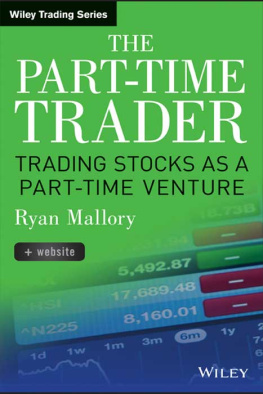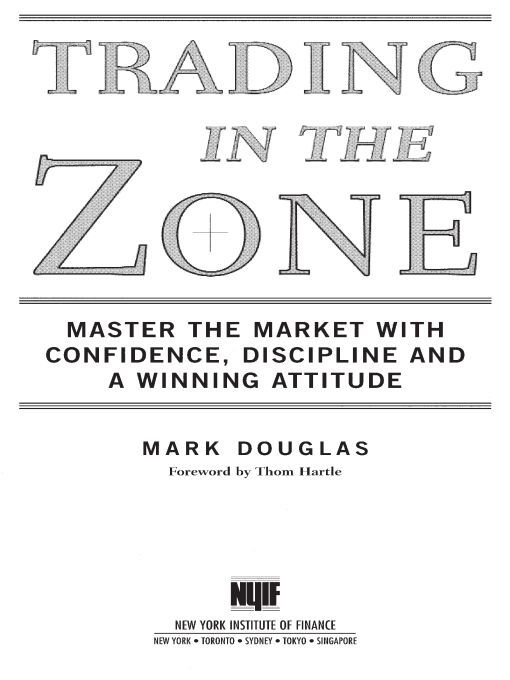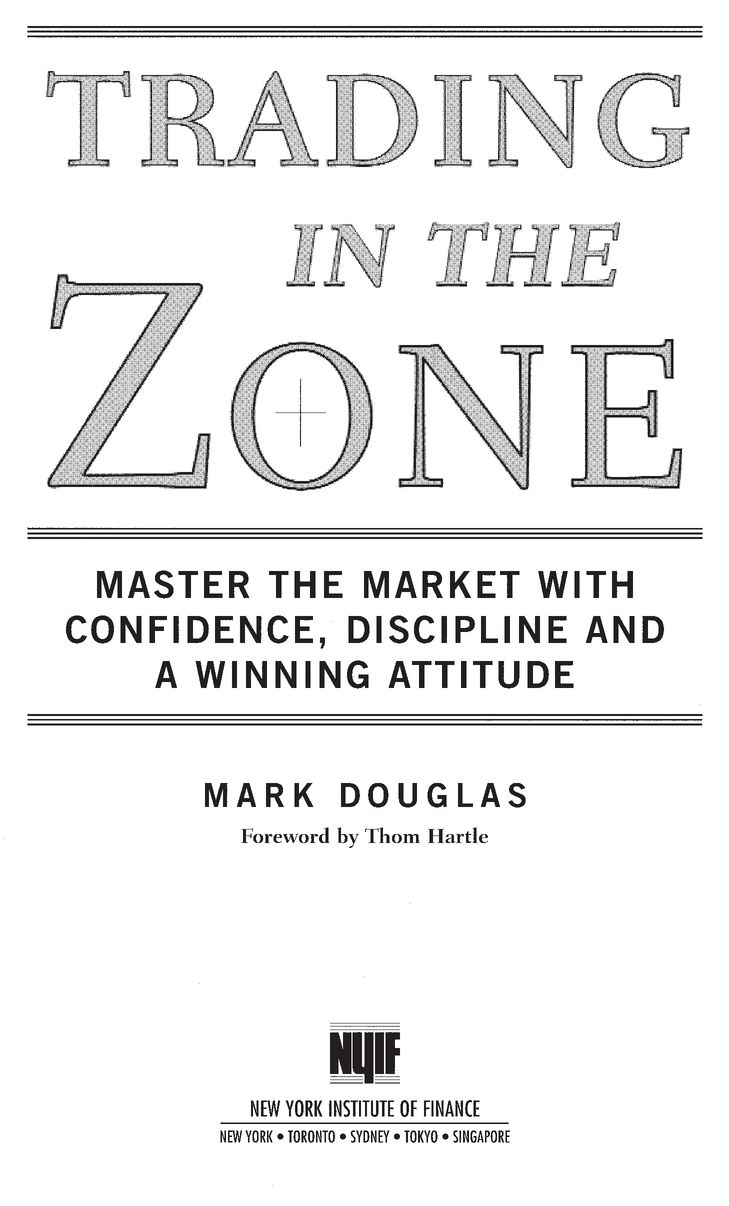Table of Contents
DEDICATION
This book is dedicated to all of the traders I have had the pleasure of working with over the last 18 years as a trading coach. Each of you in your own unique way is a part of the insight and guidance this book will provide to those who choose to trade from a confident, disciplined, and consistent state of mind.
FOREWORD
The great bull market in stocks has led to an equally great bull market in the number of books published on the subject of how to make money trading the markets. Many ideas abound, some good, some not, some original, some just a repackaging of earlier works. Occasionally, though, a writer comes forward with something that really sets him or her apart from the pack, something special. One such writer is Mark Douglas.
Mark Douglas, in Trading in the Zone, has written a book that is the accumulation of years of thought and researchthe work of a lifetimeand for those of us who view trading as a profession, he has produced a gem.
Trading in the Zone is an in-depth look at the challenges that we face when we take up the challenge of trading. To the novice, the only challenge appears to be to find a way to make money. Once the novice learns that tips, brokers advice, and other ways to justify buying or selling do not work consistently, he discovers that he either needs to develop a reliable trading strategy or purchase one. After that, trading should be easy, right? All you have to do is follow the rules, and the money will fall into your lap.
At this point, if not before, novices discover that trading can turn into one of the most frustrating experiences they will ever face. This experience leads to the oft-started statistic that 95 percent of futures traders lose all of their money within the first year of trading. Stock traders generally experience the same results, which is why pundits always point to the fact that most stock traders fail to out-perform a simple buy and hold investment scenario.
So, why do people, the majority of whom are extremely successful in other occupations, fail so miserably as traders? Are successful traders born and not made? Mark Douglas says no. Whats necessary, he says, is that the individual acquire the traders mindset. It sounds easy, but the fact is, this mindset is very foreign when compared with the way our life experiences teach us to think about the world.
That 95-percent failure rate makes sense when you consider how most of us experience life, using skills learned as we grow. When it comes to trading, however, it turns out that the skills we learn to earn high marks in school, advance our careers, and create relationships with other people, the skills we are taught that should carry us through life, turn out to be inappropriate for trading. Traders, we find out, must learn to think in terms of probabilities and to surrender all of the skills we have acquired to achieve in virtually every other aspect of our lives. In Trading in the Zone, Mark Douglas teaches us how. He has put together a very valuable book. His sources are his own personal experiences as a trader, a traders coach in Chicago, author, and lecturer in his field of trading psychology.
My recommendation? Enjoy Douglass Trading in the Zone and, in doing so, develop a traders mindset.
THOM HARTLE
PREFACE
The goal of any trader is to turn profits on a regular basis, yet so few people ever really make consistent money as traders. What accounts for the small percentage of traders who are consistently successful? To me, the determining factor is psychologicalthe consistent winners think differently from everyone else.
I started trading in 1978. At the time, I was managing a commercial casualty insurance agency in the suburbs of Detroit, Michigan. I had a very successful career and thought I could easily transfer that success into trading. Unfortunately, I found that was not the case. By 1981, I was thoroughly disgusted with my inability to trade effectively while holding another job, so I moved to Chicago and got a job as a broker with Merrill Lynch at the Chicago Board of Trade. How did I do? Well, within nine months of moving to Chicago, I had lost nearly everything I owned. My losses were the result of both my trading activities and my exorbitant life style, which demanded that I make a lot of money as a trader.
From these early experiences as a trader, I learned an enormous amount about myself, and about the role of psychology in trading. As a result, in 1982, I started working on my first book, The Disciplined Trader: Developing Winning Attitudes. When I began this project I had no concept of how difficult it was to write a book or explain something that I understood for myself in a manner and form that would be useful to other people. I thought it was going to take me between six and nine months to get the job done. It took seven and a half years and was finally published by Prentice Hall in 1990.
In 1983, I left Merrill Lynch to start a consulting firm, Trading Behavior Dynamics, where I presently develop and conduct seminars on trading psychology and act in the capacity of what is commonly referred to as a trading coach. Ive done countless presentations for trading companies, clearing firms, brokerage houses, banks, and investment conferences all over the world. Ive worked at a personal level, one on one, with virtually every type of trader in the business, including some of the biggest floor traders, hedgers, option specialists, and CTAs, as well as neophytes
As of this writing, I have spent the last seventeen years dissecting the psychological dynamics behind trading so that I could develop effective methods for teaching the proper principles of success. What Ive discovered is that, at the most fundamental level, there is a problem with the way we think. There is something inherent in the way our minds work that doesnt fit very well with the characteristics shown by the markets.
Those traders who have confidence in their own trades, who trust themselves to do what needs to be done without hesitation, are the ones who become successful. They no longer fear the erratic behavior of the market. They learn to focus on the information that helps them spot opportunities to make a profit, rather than focusing on the information that reinforces their fears.
While this may sound complicated, it all boils down to learning to believe that: (1) you dont need to know whats going to happen next to make money; (2) anything can happen; and (3) every moment is unique, meaning every edge and outcome is truly a unique experience. The trade either works or it doesnt. In any case, you wait for the next edge to appear and go through the process again and again. With this approach you will learn in a methodical, non-random fashion what works and what doesnt. And, just as important, you will build a sense of self-trust so that you wont damage yourself in an environment that has the unlimited qualities the markets have.
Most traders dont believe that their trading problems are the result of the way they think about trading or, more specifically, how they are thinking while they are trading. In my first book, The Disciplined Trader, I identified the problems confronting the trader from a mental perspective and then built a philosophical framework for understanding the nature of these problems and why they exist. I had five major objectives in mind in writing




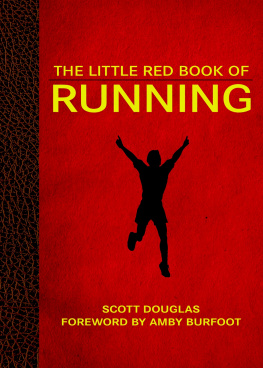



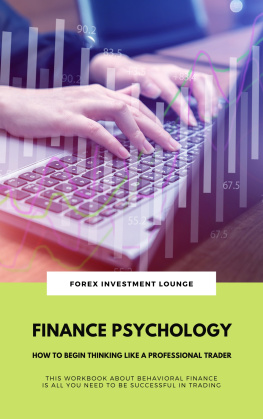
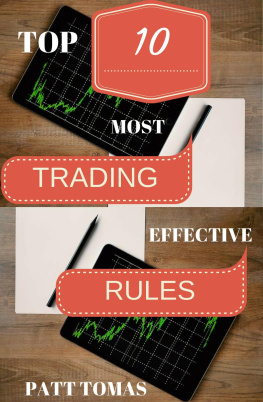
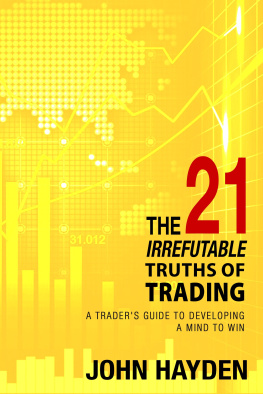
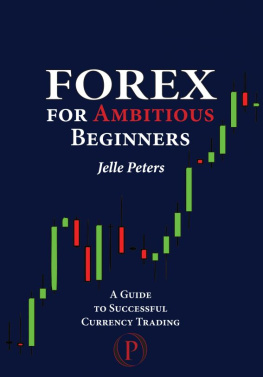
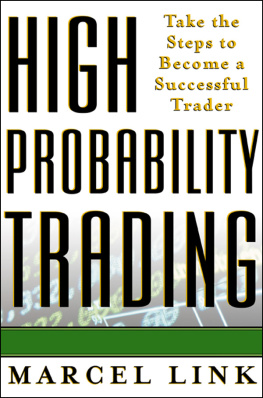
![Ryan Mallory [Ryan Mallory] - The Part-Time Trader: Trading Stock as a Part-Time Venture, + Website](/uploads/posts/book/124134/thumbs/ryan-mallory-ryan-mallory-the-part-time-trader.jpg)
